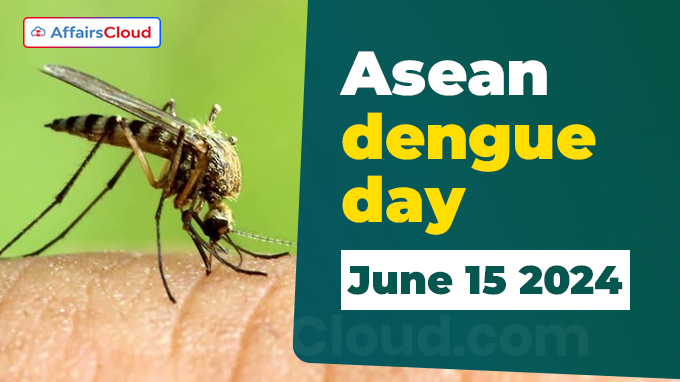 The Association of Southeast Asian Nations (ASEAN) annually celebrates ASEAN Dengue Day (ADD) on 15 June to raise awareness of Dengue, mobilise resources for its prevention and control at the regional and national level, and demonstrate the region’s commitment to tackling the disease.
The Association of Southeast Asian Nations (ASEAN) annually celebrates ASEAN Dengue Day (ADD) on 15 June to raise awareness of Dengue, mobilise resources for its prevention and control at the regional and national level, and demonstrate the region’s commitment to tackling the disease.
- ADD allows the ASEAN Member States (AMS) to foster measures preventing Dengue, in coordination with the World Health Organisation (WHO).
WHO has provided technical and financial support to the ASEAN Secretariat and the AMS for the Dengue Day activities since its inception.
Note: The WHO has set a goal of eliminating all deaths from dengue by 2030 as part of its 2021–2030 Sustainable Development Goals (SDGs).
7th Asia Dengue Summit (ADS):
i.The Asia Dengue Summit (ADS) is a gathering of experts from the dengue community to share ideas and strategies for managing dengue in the region.
ii.The 7th Asia Dengue Summit was held from 4th – 7th June 2024 in Kuala Lumpur, Malaysia, under the theme ‘Towards Zero Dengue Deaths: Innovation, Collaboration, Action in Asia’.
Background:
i.The observance of ASEAN Dengue Day was endorsed at the 10th ASEAN Health Ministers Meeting in 2010 as a key regional advocacy initiative against dengue to be commemorated every June 15 by all AMS.
ii.The first official ADD was observed on 15 June 2011. The 1st regional event was held in 2011 in Jakarta, Indonesia,
iii.In 2012, the WHO joined the ASEAN in marking the ASEAN Dengue Day on 15 June.
Dengue:
i.Dengue (break-bone fever) is a vector-borne disease transmitted to humans through the bite of an infected female mosquito mainly of the species Aedesaegypti.
ii.It is a viral infection caused by the viruses carried by the mosquito and is found in tropical and sub-tropical climates globally.
iii.Dengue Virus (DENV) belongs to the family Flaviviridae (genus Flavivirus).
Treatment:
i.There is no specific treatment for dengue. The primary focus is on managing pain symptoms.
ii.Most cases can be treated at home using pain relievers like acetaminophen (paracetamol).
Vaccine:
i.Dengvaxia® (CYD-TDV), developed by Sanofi Pasteur was first licensed in December 2015, in Mexico for use in people aged 9–45 living in endemic areas.
ii.On 10 May 2024, WHO prequalified Qdenga® (TAK-003), a new dengue vaccine developed by Takeda. This is the 2nd dengue vaccine to receive such recognition.
- It is a live-attenuated vaccine with weakened versions of the 4 dengue virus serotypes (DEN-1, DEN-2, DEN-3, and DEN-4).
iii.WHO recommends the use of TAK-003 in children aged 6–16 years in settings with high dengue burden and transmission intensity.
Global Burden:
i.Dengue cases have surged from 505,430 in 2000 to 5.2 million in 2019, reaching a historic high of over 6.5 million cases in 2023.
- Many cases are asymptomatic or misdiagnosed, leading to under-reporting.
ii.The highest number of dengue cases was recorded in 2023, affecting over 80 countries in all the regions of WHO, with more than 7300 deaths.
iii.The Americas, Southeast Asia, and Western Pacific regions bear the highest burden, with Asia representing about 70% of global cases.
iv.A high number of cases reported in Asia were in: Bangladesh (321 000), Malaysia (111 400), Thailand (150 000), and Viet Nam (369 000).
Current Statistics:
i.As of April 30, 2024, over 7.6 million dengue cases have been reported to the WHO.
- This includes 3.4 million confirmed cases, over 16,000 severe cases, and more than 3,000 deaths.
ii.Regional Impact:
The Americas have seen a significant increase, with over 7 million cases by April 2024.
- This number surpasses the 2023 annual high of 4.6 million cases and is three times higher than the same period in 2023.
About Association of Southeast Asian Nations (ASEAN):
Secretary-General– Dr. Kao Kim Hourn (Cambodia)
Chairmanship (2024)- Lao People’s Democratic Republic ((Lao PDR)
Theme (2024)- ASEAN: Enhancing Connectivity and Resilience
Headquarters– Jakarta, Indonesia
Established in 1967




